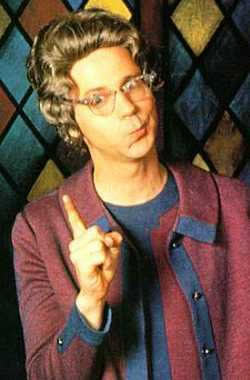 IT WAS A BAD WEEK. My last living aunt had passed away. Her name was Liz, and she was a hoot. If you’re old enough to remember Phyllis Diller or Carol Channing you’ll have a general idea of how much fun she was. I’ll miss her so. Then the next day I had lunch with a friend whose wife had just filed for divorce. My friend has a drinking problem, and his wife decided she couldn’t take it anymore. After lunch I spent time with another hurting friend whose only child was down to one last hope—an experimental therapy—to beat his cancer.
IT WAS A BAD WEEK. My last living aunt had passed away. Her name was Liz, and she was a hoot. If you’re old enough to remember Phyllis Diller or Carol Channing you’ll have a general idea of how much fun she was. I’ll miss her so. Then the next day I had lunch with a friend whose wife had just filed for divorce. My friend has a drinking problem, and his wife decided she couldn’t take it anymore. After lunch I spent time with another hurting friend whose only child was down to one last hope—an experimental therapy—to beat his cancer.
Meanwhile, I had to write 1,000 good words that day, and do it again the next day, and every other day until September if I was going to meet the deadline on my next novel.
The word count wasn’t the real problem. I’ve been at this writing game a long time. I’ve written amidst the distractions of airports, coffee shops and shopping malls. Even with all of this emotional turmoil I could probably still deliver 5,000 or even 10,000 readable words a day. But good words . . . aye, to quote the Bard, there’s the rub.
It’s tempting to lose focus and begin to wonder why I bother. In a world like this, excellence in the arts can seem like such a trivial pursuit. Indeed, never mind excellence, the reason art matters at all is sometimes questioned. With grief, loneliness, addiction, pain and fear all around us, what’s the point of literature? Why paint? Why sculpt? Why dance, or act, or sing? Why not devote oneself to something practical instead?
Near the end of the book of Job, after that unfortunate man’ many sufferings, he learns nothing of their reasons. He gets no answer to Rabbi Kushner’s famous question, ‘Why do bad things happen to good people?’ Even so, in the end Job is satisfied. God appears, and Job says, “My ears had heard of you but now my eyes have seen you.” God appears, and his appearing is enough for Job.
My friend Brad, a professor at a well-known college of fine art, tells me it’s been fashionable for many years in the art community to question the existence of beauty. Not to question beauty’s definition or value, understand, but to question its very existence. It is an old idea. It is the lament of Ecclesiastes. Everything is meaningless under the sun. Yet not everything, for Job saw God and that was enough.
Once I suffered from severe depression. Like Job I cursed the day of my birth. I was saved from the temptation of suicide by snowcapped mountains, golden birches, and the sparkling Milky Way. I was saved by reflections of God’s beauty.
I don’t mean to say God is beautiful. No mere adjective applies to him. St. John tells us “God is love.” God is beautiful in exactly the same way. Like love, beauty is God’s essence. Beauty does not describe God; it is the fact of God. It is his glory, his weight, the very thing the prophet Moses begged to see on Sinai.
Beauty exists because God exists. To reveal beauty is to reveal God. Therefore, if our art is beautiful, if we struggle to write good words instead of merely readable ones, then sometimes, just for an instant, God appears and God’s appearing is enough. In a world of grief, loneliness, addiction, pain and fear, no act of man could be more practical than that.
The original version of this essay was first published May 20, 2010 at Novel Journey


